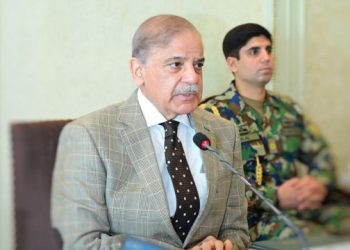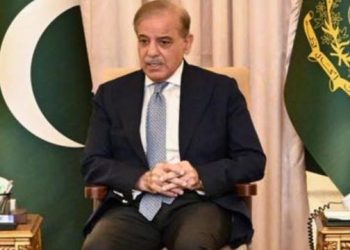ISLAMABAD: Prime Minister Shehbaz Sharif announced a reduction in electricity prices for household users by 7 rupees and 41 paisa per unit. After this, the price for all household users will be 38 rupees and 37 paisa per unit. He also announced a decrease of 7 rupees and 59 paisa per unit for industrial users, bringing their rate to 40 rupees and 60 paisa per unit.
A ceremony was held in Islamabad about the government’s package to reduce electricity rates. Federal ministers and political figures attended the event. It began with a recitation of the Quran, followed by a Naat in praise of the Prophet.
Prime Minister Shehbaz Sharif said he came to share good news with the nation. He mentioned that when his government took over, there were talks of bankruptcy. The IMF was not ready to listen, there was no money to run power plants, and meeting energy needs was very difficult.
He said some people who brought Pakistan close to default were celebrating, believing nothing could save the country. According to him, this group crossed all limits to push Pakistan toward default.
Pakistan New Electricity Prices For Households and Industrial Users:
| User Type | Price Reduction (per unit) | New Price (per unit) |
|---|---|---|
| Household Users | 7 rupees 41 paisa | 38 rupees 37 paisa |
| Industrial Users | 7 rupees 59 paisa | 40 rupees 60 paisa |
He added that the same group broke its own agreement with the IMF and created obstacles to save Pakistan from default. A finance minister even wrote letters to the IMF, putting big hurdles in the way of economic stability.
Shehbaz Sharif said the economy has now moved from darkness to light. He praised the patience of the nation, the business community, and especially the common people. He also thanked Army Chief Syed Asim Munir for his full support during this process.
ALSO READ | FIA dismisses 51 staff over human trafficking links in three years
He said the country’s development journey has begun, though it will be challenging. Over the past year, petrol prices dropped by 38 rupees per liter, and Pakistan now has the lowest petroleum prices in the region. Interest rates have fallen from 22.5% to 12%, helping businesses, while inflation has decreased from 38% to single digits.
He noted that decisions like privatization and rightsizing are necessary because subsidies cannot be given under the IMF program. The IMF loans cost the nation 800 billion rupees yearly. He believes politicians and institutions need to collect this amount together.
The Prime Minister said tax collection will increase by 35%, which is less than the IMF agreement but more than in past years. If successful, this will reduce debts and make borrowing easier. He stressed that until electricity prices drop significantly, industries, trade, and agriculture cannot grow. He urged people to move forward without looking back.
At the ceremony, Shehbaz Sharif greeted the nation and participants with Eid wishes. He said economic progress has brought this chance to share good news. Attendees included Deputy Prime Minister Ishaq Dar, federal ministers like Awais Leghari, Muhammad Aurangzeb, Rana Sanaullah, Khawaja Asif, and others, along with government officials, PML-N leader Khawaja Saad Rafique, business community members, and parliamentarians.
ALSO READ | Punjab’s SP Aisha Butt wins prestigious international police award
Shehbaz Sharif said his party’s promise from its manifesto—to improve the economy and lower electricity rates—is being fulfilled. He recalled facing a weak economy and default risks when they took over, but they worked hard to overcome these challenges.
Federal Minister for Energy Awais Leghari also spoke. He said the Prime Minister’s leadership and year-long efforts are showing results.
Reforms in the energy sector are moving forward with transparency and merit. He mentioned that solid steps have been taken, and a task force with capable officers was formed to address issues faced by the public and industries.
Prime Minister Shehbaz Sharif spoke about recent changes in petroleum and energy policies. He said that in the last two weeks, when global petroleum prices dropped, he decided to keep the prices steady in Pakistan to benefit the nation directly. He mentioned that they convinced the IMF to agree to this plan.
He also talked about discussions with Independent Power Producers (IPPs). When IPPs were set up, they worked well, he said. During negotiations, the government told them they had earned profits many times over—hundreds of percent. The Prime Minister asked them to pass some of these benefits to the public. He said his team worked hard and reached an agreement with the IPPs.
He explained that the team saved 3,696 billion rupees through these talks. This amount was what the IPPs were supposed to be paid over 15 years, but now it does not need to be paid.
Shehbaz Sharif added that there is a circular debt of 2,393 billion rupees, which has been managed. He said this debt will be cleared in the next five years.
He pointed out that government power plants have been shut for years but were still receiving billions in benefits. He called this a structural problem that needs to be fixed completely. In one year, his team sold these power plants, earning 9 billion rupees. Before this, the plants cost 7 billion rupees yearly to maintain. He said it is time to get rid of this burden for good.














